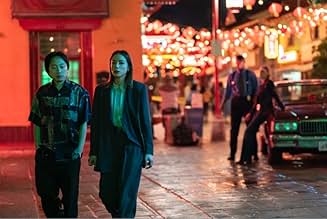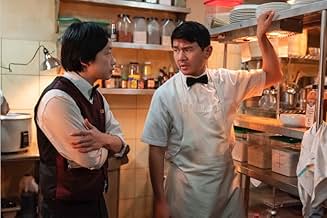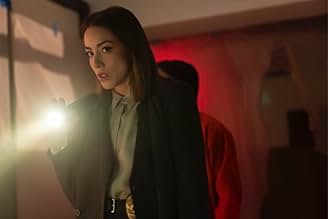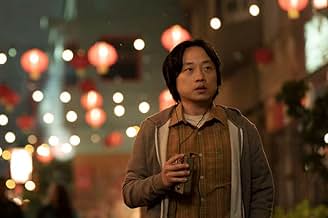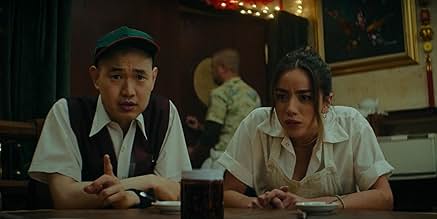Interior Chinatown
- Miniserie de TV
- 2024
- Apta para mayores
La historia de un actor asiático-americano que lucha contra los estereotipos y los papeles estereotipados, tanto en el trabajo como en su vida personal.La historia de un actor asiático-americano que lucha contra los estereotipos y los papeles estereotipados, tanto en el trabajo como en su vida personal.La historia de un actor asiático-americano que lucha contra los estereotipos y los papeles estereotipados, tanto en el trabajo como en su vida personal.
- Premios
- 1 premio y 1 nominación en total
Explorar episodios
Reseñas destacadas
I'm not saying you have to be super intelligent to follow and enjoy this offbeat spectacular production but what I do believe though for inquisitive people searching for twists that add up and not the run of the mill entertainment there's proble no chance you wouldn't enjoy "Interior Chinatown". This being about my 250th review I've only given a 9 or higher about 35 times throughout my decade of reviews on IMDB which to me says a lot in it's self. If your unaware of the Hollywood era in TV/ Movies we currently are closing out of it's the Multiple dimensions era but what's so fascinating about this show it truly succeeded blending reality and the alternative so uniquely by squarely showing our inner anxieties, life regrets and persinal failures or ambitions so clear without pause you have no choice but to get fully swept into such a funny far out intricately woven story that turns out to be one of the truest tales ever told.. Highmarks all around Acting, Directing, Set design and casting but a super chef's kiss to the teleplay screenwriters for this outstanding idea perfectly fleshed out. BRAVO.
Ok so I'm like a guy who casually watches television and comes on here to look at trivia and some reviews. I never thought I had to come on here and make a review but for this show I'm happy to. This is a show for the people that are more akin to a Rick and Morty with the way if you watch from afar it'll look like total chaos and no plot but if you try to watch and look for the little things in the direction, dialogue, and the music choices you'll possibly see the brilliance that was made into this show. I need season 2. All I ask is more marketing so people can see. Well all I can say now is be nice to people and be nice to yourself have a good one.
It's tough to describe this show, which is probably why I feel like all the descriptions that I've read don't quite seem to fit. The way it plays with its premise, it's rather ambiguous as to how the "show within the show" really works: there's reality mixed with television, seriousness mixed with absurdity. The lines are often blurred, which is a strength. It can be a little confusing, but it's one of those premises where sometimes you just have to stop trying to overthink and enjoy it for what it is. They do a good job of easing into the concept and keeping the logic consistent. The writing is very good, the humor is abundant, and the acting is great. This is a great cast, and no character goes to waste. Good pacing, good direction. The episodes fly by. I can see why this might not be for some, but for me it's one of the best new shows I've seen in a long time.
It's a mystery, you have to watch it to learn more.
This is a show that goes against the grain in a way that can be a bit uncomfortable or eve disservice the plot at times. I can't say it's beautiful or perfect, but there are fantastic qualities to it. The acting is fantastic, the actors change their quality and style of acting dependent on the genres of each scene, which switch between parody and existential mystery constantly. The style of directing, camerawork, writing/dialogue, and even color grading change depending on which type of cop procedural any one scene is parodying, though the majority target the more generic slew of bland, low budget, blue tinged cop TV.
It can feel cheesy at times, the visual effects/direction of some scenes come across as weak and distracting, some of the b-plots aren't particularly engaging and seem to conflict with the tone of the show, and sometimes some of the jokes or plot points are a bit obvious before they happen. The positives do a lot to make it still a fun watch, but they don't really go much of anywhere.
The chemistry between the leads is very high, the comedy lands well for anyone who's slogged through a dumb police procedural, the characters are fun to watch on screen. It's a parody of police dramas, a police drama, a period piece, a touching family story, a coming of age adventure, and an existential allegory, but the end result is less than the sum of its parts, no matter how nice those parts are.
The main thing though, is that it sacrifices it's satisfaction and entertainment value to serve its many interwoven, painfully obvious allegories. It was made to be and end somewhat uncomfortably and unsatisfactory on purpose, to serve a point, but that point was beaten so far to death over the course of the show that this was just... unnecessary. And at the cost of enjoying the thing I'm watching? Wasteful.
This is a show that goes against the grain in a way that can be a bit uncomfortable or eve disservice the plot at times. I can't say it's beautiful or perfect, but there are fantastic qualities to it. The acting is fantastic, the actors change their quality and style of acting dependent on the genres of each scene, which switch between parody and existential mystery constantly. The style of directing, camerawork, writing/dialogue, and even color grading change depending on which type of cop procedural any one scene is parodying, though the majority target the more generic slew of bland, low budget, blue tinged cop TV.
It can feel cheesy at times, the visual effects/direction of some scenes come across as weak and distracting, some of the b-plots aren't particularly engaging and seem to conflict with the tone of the show, and sometimes some of the jokes or plot points are a bit obvious before they happen. The positives do a lot to make it still a fun watch, but they don't really go much of anywhere.
The chemistry between the leads is very high, the comedy lands well for anyone who's slogged through a dumb police procedural, the characters are fun to watch on screen. It's a parody of police dramas, a police drama, a period piece, a touching family story, a coming of age adventure, and an existential allegory, but the end result is less than the sum of its parts, no matter how nice those parts are.
The main thing though, is that it sacrifices it's satisfaction and entertainment value to serve its many interwoven, painfully obvious allegories. It was made to be and end somewhat uncomfortably and unsatisfactory on purpose, to serve a point, but that point was beaten so far to death over the course of the show that this was just... unnecessary. And at the cost of enjoying the thing I'm watching? Wasteful.
Interior Chinatown is a brilliant yet understated reflection of the world-a mirror that exposes how society often judges people by their covers. The show captures this poignantly with the scene where Willis Wu can't get into the police precinct until he proves his worth by delivering food. It's a powerful metaphor: sometimes, if you don't fit the mold, you have to prove your value in the most degrading or unexpected ways just to get a foot in the door. The locked precinct doors represent barriers faced by those who don't match the "majority's" idea of what's acceptable or valuable.
While the series centers on the Asian and Pacific Islander (API) community and the stereotypical roles Hollywood has long relegated them to-background extras, kung fu fighters-it forces viewers to confront bigger questions. It makes you ask: Am I complicit in perpetuating these stereotypes? Am I limiting others-or even myself-by what I assume is their worth? It's not just about API representation; it's about how society as a whole undervalues anyone who doesn't fit neatly into its preferred narrative.
The show can feel confusing if you don't grasp its satirical lens upfront. But for me, knowing the context of Charles Yu's original book helped it click. The production team does an incredible job balancing satire with sincerity, blurring the line between real life and the exaggerated Hollywood "procedural" format. They cleverly use contrasting visuals and distinct camera work to draw you into different headspaces-Hollywood's glossy expectations versus the grittier reality of life.
Chloe Bennet's involvement (real name Chloe Wang) ties into the show's themes on a deeply personal level. She famously changed her last name to navigate Hollywood, caught in the impossible middle ground of not being "Asian enough" or "white enough" for casting directors. It's a decision that sparks debate-was it an act of survival, assimilation, or betrayal? But for Bennett, it was about carving a space for herself to pursue her dreams.
This theme echoes in one of the show's most poignant scenes, where Lana is told, "You will never completely understand. You're mixed." It's a crushing acknowledgment of the barriers that persist, even when you're trying to bridge divides. Lana's story highlights how identity can be both a strength and an obstacle, and the line serves as a painful reminder of the walls society creates-externally and internally.
Interior Chinatown doesn't just ask us to look at the system; it forces us to examine ourselves. Whether it's Willis Wu at the precinct door or Lana trying to connect in a world that sees her as neither this nor that, the show unflinchingly portrays the struggle to belong. And as viewers, it challenges us to question our role in those struggles: Are we helping to dismantle the barriers, or are we quietly reinforcing them?
While the series centers on the Asian and Pacific Islander (API) community and the stereotypical roles Hollywood has long relegated them to-background extras, kung fu fighters-it forces viewers to confront bigger questions. It makes you ask: Am I complicit in perpetuating these stereotypes? Am I limiting others-or even myself-by what I assume is their worth? It's not just about API representation; it's about how society as a whole undervalues anyone who doesn't fit neatly into its preferred narrative.
The show can feel confusing if you don't grasp its satirical lens upfront. But for me, knowing the context of Charles Yu's original book helped it click. The production team does an incredible job balancing satire with sincerity, blurring the line between real life and the exaggerated Hollywood "procedural" format. They cleverly use contrasting visuals and distinct camera work to draw you into different headspaces-Hollywood's glossy expectations versus the grittier reality of life.
Chloe Bennet's involvement (real name Chloe Wang) ties into the show's themes on a deeply personal level. She famously changed her last name to navigate Hollywood, caught in the impossible middle ground of not being "Asian enough" or "white enough" for casting directors. It's a decision that sparks debate-was it an act of survival, assimilation, or betrayal? But for Bennett, it was about carving a space for herself to pursue her dreams.
This theme echoes in one of the show's most poignant scenes, where Lana is told, "You will never completely understand. You're mixed." It's a crushing acknowledgment of the barriers that persist, even when you're trying to bridge divides. Lana's story highlights how identity can be both a strength and an obstacle, and the line serves as a painful reminder of the walls society creates-externally and internally.
Interior Chinatown doesn't just ask us to look at the system; it forces us to examine ourselves. Whether it's Willis Wu at the precinct door or Lana trying to connect in a world that sees her as neither this nor that, the show unflinchingly portrays the struggle to belong. And as viewers, it challenges us to question our role in those struggles: Are we helping to dismantle the barriers, or are we quietly reinforcing them?
¿Sabías que...?
- CuriosidadesEarly in the series, Willis (Jimmy O. Yang), Fatty (Ronny Chieng), and Carl (Chau Long) see Detective Lana Lee (Chloe Bennet) on TV and debate her possible ethnicity: Carl declares, "she looks Thai," while Fatty argues, "Dude, she's clearly Korean. Know your Asians." In fact, Bennet is the child of a white mother and a Chinese father. Earlier in her acting career she changed her last name from Wang to Bennet (her father's first name) after encountering casting agents who said they were unable to cast her as Asian or Asian American characters, but her name precluded her consideration for white characters either.
Selecciones populares
Inicia sesión para calificar y añadir a tu lista para recibir recomendaciones personalizadas
- How many seasons does Interior Chinatown have?Con tecnología de Alexa
Detalles
- Fecha de lanzamiento
- País de origen
- Sitio oficial
- Idioma
- Títulos en diferentes países
- 內景唐人街
- Localizaciones del rodaje
- Empresas productoras
- Ver más compañías en los créditos en IMDbPro
- Color
- Mezcla de sonido
- Relación de aspecto
- 16:9 HD
Contribuir a esta página
Sugerir un cambio o añadir el contenido que falta





